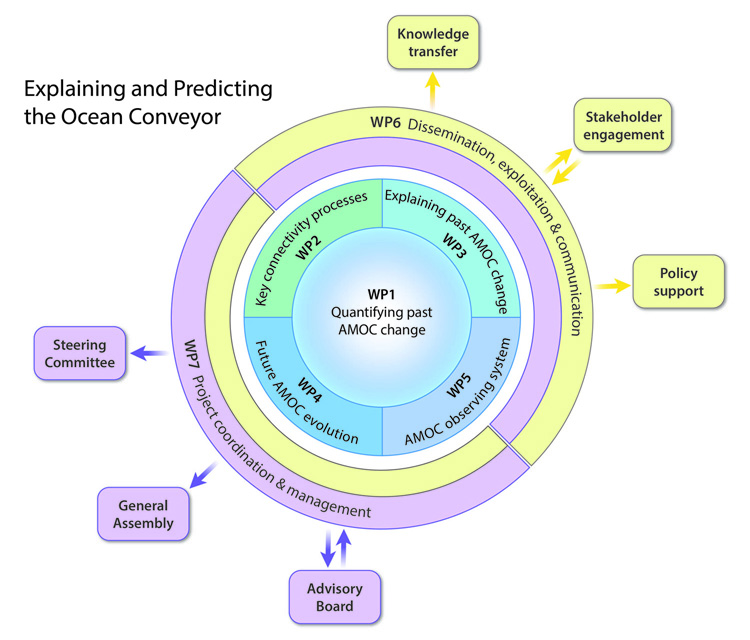Project overview
Ocean circulation – the movement of water masses around the ocean basin – is the engine of earth’s climate system. It is responsible for the storage and distribution of heat around the ocean, as well as nutrients, oxygen and carbon. In the Atlantic, strong overturning circulation is driven by warm surface water in equatorial regions being drawn towards the poles where it cools and becomes more saline, sinks and then returns towards the equator. This is known as the Atlantic Meridional Overturning Circulation (AMOC).
Many scientific misconceptions exist about the nature of AMOC and its role in climate regulation. EPOC aims to generate a new concept of the AMOC, its function in the Earth system and how it impacts weather and climate. Read more about EPOC’s concept and approach in the Our Work section.
The EPOC consortium brings together all the necessary expertise and resources to address the major deficiencies in the current understanding of the AMOC in the ocean-climate nexus, and will strengthen inter-disciplinary approaches involving experts in ocean biogeochemistry and physical oceanography, and between modellers and observationalists.
EPOC comprises 21 partners and associate partners, including French, German and Norwegian universities and research institutions, and associate partners from the UK, USA and Canada.
 EPOC Key Facts
EPOC Key Facts
Funded through Horizon Europe, call HORIZON-CL6-2021-CLIMATE-01
Funding volume: € 8M EC contribution
Duration: 60 months from 1 July 2022
Partnership: 21 partners from six countries, including USA and Canada
Coordinator: Dr Eleanor Frajka-Williams, Universität Hamburg
EPOC has five overarching scientific objectives:
- Generate comprehensive records of AMOC transports across the whole Atlantic, to assess the timescales of transport variability and the degree to which the AMOC behaves as a conveyor belt.
- Determine key processes that make or break meridional connectivity of ocean transports, and assess their representation in models, especially in high resolution coupled simulations.
- Identify the processes and drivers of recent change in the AMOC, and infer the likely roles of natural and anthropogenic forcings, and internal variability
- Assess the key processes of future AMOC changes, and identify indicators of abrupt changes and AMOC-related climate impacts with societal relevance.
- Design, and deploy elements of, a next generation observing system for the entire system of the AMOC.

